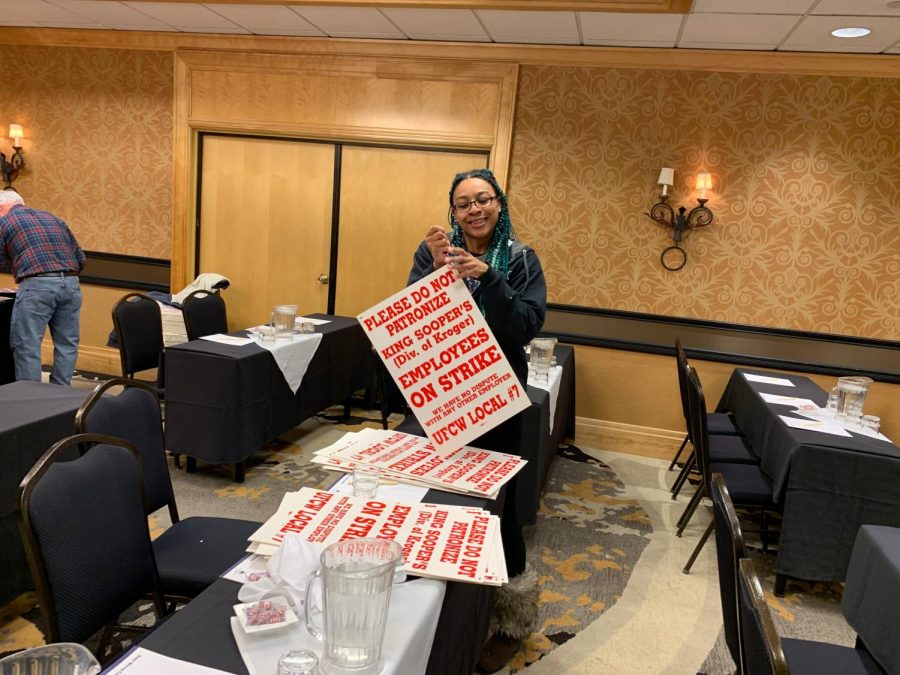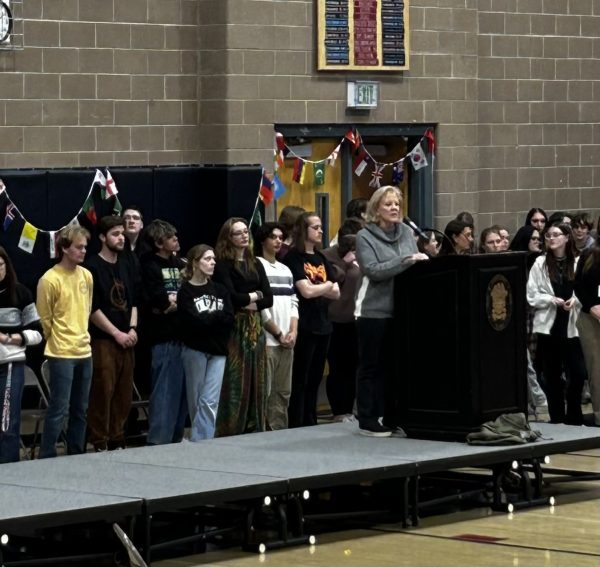The Power of Organization
Many would like to believe that we now live in a society that does not require the presence of labor unions. The current situation with King Soopers shows that they could not be more wrong.
In preparation of a strike, union representatives prepare their picket signs.
March 19, 2019
It was May of 1996 when the United Food and Commercial Workers, a major Labor Union for employees in Colorado and Wyoming, last went on strike against a grocery store. It involved over 12,000 employees, lasted 44 days, and was one of the largest worker stoppages that year. It ended up being with King Soopers, a company owned by Kroger that operates primarily in Colorado.
Now, 23 years later, 92% of the 8,000 employees of King Soopers in the Denver Metro Area have voted to go on strike once more. The decision came after months of bargaining for a contract that seemingly went nowhere, leaving employees and the company both frustrated and at their wits’ end.
While the vote is a step towards progress for employees who want a better contract, this is a scary thought for King’s shoppers; King Soopers is spread out mostly in Colorado, with 152 of their 156 stores operating in the state. At the same time, crossing a picket line is seen as disrespectful for the workers fighting for better pay.
“My biggest concern is the prescriptions,” Sarah Levy told ABC7 on Saturday. “When I cross that picket line, people are gonna get upset, but I need my prescriptions.”
Luckily for people like Levy, the strike notice caused the company to re-open negotiations and hopefully come to a deal that will please both the employees and the company. This doesn’t mean a strike won’t happen, but now the power is in the UFCW’s hands on if or when the employees walk off the jobs to protest.
But In the end, even despite the re-opened negotiations, King Soopers customers may be wondering, what exactly led to the workers calling for a strike?
—
When it comes to negotiating contracts, it should be noted that the climate can become heated very quickly. In this case, tensions spiked in a matter of weeks, with workers calling to strike on the UFCW Facebook page on the sixth day of negotiations alone. From the beginning, the Union had the goal of increasing wages across the board for employees, ending “two-tier” discrimination, and increasing health benefits (i.e, first-day sick pay). King Soopers had their own goals, obviously: to increase profit in any way possible.
It doesn’t seem to be so much of a difference (or even a big deal), but it is. Businesses, throughout history, have cut corners to gain the highest possible profit, even at the expense of their employees. This is why unions were organized in the first place; employees felt they deserved better (and they were right)! And yet, when conditions were bearable and the best they’d been in a long time, things went awry. Some unions were found to be erroneously corrupt, shocking the nation. It was understandable, though; the scandals that sprang to the surface were shocking and enraging.
However, the consequences were dire. Little by little, union membership dropped, weakening the power of the employees and strengthening the power of the companies. In Colorado, union membership was below the national average in 2017, but has steadily increased since 2008. This is a stark contrast, as the national average has steadily decreased since 2008. So while the state may have a weaker union compared to the rest of the nation, the representatives fight twice as hard to make sure the employees are treated fairly and with the respect they deserve.
Unfortunately for King’s, respect is not synonymous with profit. So, according to the UFCW Local 7R Facebook Page, the company proposed to have a 35-cent increase for journeymen clerks (which are top employees that make up less than half of the employees at King Soopers), remove union protections from managers, and only offered sick pay after ten years. This was all they were willing to give, and when neither side budged, what is known as “good faith bargaining” went out the window. According to the UFCW, representatives for the company allegedly arrived 3-4 hours late, would walk out of negotiation meetings if they felt progress wasn’t being made, destroyed official union notices, and posted notices searching for temporary workers.
That last one ended up being the real kicker for King Soopers employees; the UFCW and King Soopers had an agreement prohibiting the company from seeking temporary workers during negotiations. On top of that, the starting wage for these temporary workers was higher than the proposal for the workers they already had, so the notice was considered a slap in the face for the employees who had worked there for years – even decades.
That is ridiculous; instead of investing money into the loyal workers they already have, they decided to put their tax break they received into temporary workers, also known as “scabs.” Instead of paying the workers who helped make their company the well-known staple it is in this state, they put their heads in the sand until the strike had been called.
—
Maybe I’m being too hard on King Soopers, but at the same time, I don’t really feel pity for a company that has metaphorically spit on the face of their workers in the name of maximum profit; I do feel pity for the 12,000 workers of King Soopers who have put in their blood, sweat, and tears, that have worked extremely hard for this company, only to find that the company they have worked for is refusing to give them a living wage; I do feel pity for the customers who now have to make the difficult choice on whether or not to cross the picket lines. But I do not feel bad for the company that could have avoided all of this, had they accepted that they will not be able to receive all of their own proposals. The same argument could be made for the UFCW and its employees, but I highly doubt that the King Soopers Division President is looking at the outcome of these negotiations and wondering whether or not he will be able to afford his dinner at the end of all of this.
I believe it should be noted that I have a unique perspective on this entire situation; my father has worked for the UFCW as long as our family has lived in Colorado. He started as a deli manager at a Safeway Location in Lakewood and became a Union Representative in January 2011. Since then, he has negotiated contracts for workers and defended their rights. Because of this, we’ve been a “Union Strong” Family, looking to support the employees represented whenever possible. This is why I can say with full confidence that I do support the Union and their efforts to get their employees the fair contract and rights that they deserve.













